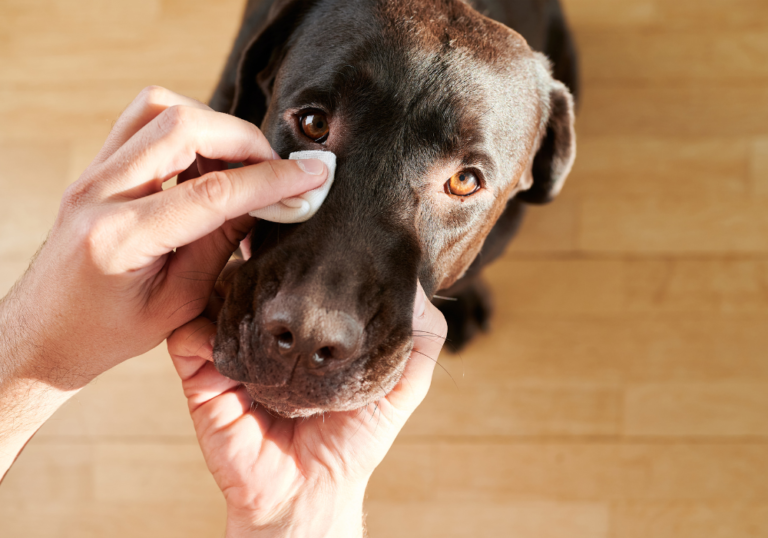Dog Conjunctivitis: Symptoms & Treatment

If you suspect your dog is suffering from a case of conjunctivitis, here’s what you need to know. From causes to symptoms and treatment options, we’ve got you covered.
Does your dog seem to have irritated, bloodshot, runny, or weepy eyes? Are they blinking a lot or rubbing their face on you or the ground? If the answer is yes, your pooch might be suffering from a case of dog conjunctivitis. Much like the human version, canine conjunctivitis can appear out of nowhere, is unpleasant, and will require professional attention. Here’s what you need to know about this condition.
What is Conjunctivitis in Dogs?
Dog conjunctivitis, also known as pink eye, is a condition caused by the inflammation of the conjunctiva, a thin, transparent membrane that covers the front part of the eyeball and lines the eyelid. The conjunctiva acts as the eye’s protective barrier designed to shield it from dirt and bacteria. If you think your pet has conjunctivitis, it’s best to consult our doctors at Acacia Pet Clinic as soon as possible, as some causes can progress quickly.
What Are the Symptoms of Dog Conjunctivitis?
In humans, we can quickly notice when our eyes become red, itchy, or sore, which makes conjunctivitis one of the easiest problems to spot. However, in dogs, the white part of their eyeball is not as readily visible, especially if they have long eyebrow hair. It’s important to be on the lookout for other symptoms your pet might be experiencing. Here are some of the most common signs of conjunctivitis in dogs:
- Eye discharge (yellow or green)
- Squinting
- Watery eyes
- Eyelids that stick together
- Excessive blinking
- Rubbing their eyes
- Swollen eyelids
These signs may be accompanied by cold-like symptoms, such as a runny nose, which can indicate a virus.
What Causes Conjunctivitis in Dogs?
Dogs love to explore every nook and cranny, which means they can easily get exposed to various triggers of conjunctivitis, from viruses or bacteria to irritants like dirt or grass seeds. Common causes leading to a swollen, red, runny, or weepy eye include:
- Irritation from foreign objects (often hidden under the eyelids)
- Smoke, mold, dust, or environmental pollutants
- Dry eyes that don’t produce enough tears
- Allergies
- Other eye problems, such as glaucoma or tumors
- Injury to the eye area
- Irritating shampoos
- Ingrown eyelids or hairs rubbing the eye surface
- Bacterial infections
- Viral infections
- Mites affecting the skin around the eyes
It can be difficult for pet owners to determine the exact cause of their dog’s eye problem, so it’s always best to consult our doctors at Acacia Pet Clinic for advice. Identifying the cause of conjunctivitis in dogs is crucial for determining the most effective treatment.
How to Treat Conjunctivitis in Dogs
With numerous potential factors that can trigger dog conjunctivitis, there isn’t a one-size-fits-all treatment. Your vet will first establish the cause of conjunctivitis before recommending any course of action. Pain relief might also be necessary, as having a sore eye isn’t pleasant for your dog.
If a foreign object is responsible for your dog’s eye issue, your vet will typically attempt to remove it. In some cases, this may require sedating your pet to minimize the risk of injury during the procedure.
If a bacterial or viral infection is the cause, treatment in the form of antibiotics or antiviral medication will be prescribed. If allergies are exacerbating the symptoms, specific treatments such as antihistamines or steroids may be suggested, administered as tablets or eye drops, or sometimes both.
Sticky yellow or green eye discharge may indicate that your dog’s ability to produce tears is compromised, leading to dry, irritated eyes. In this case, the vet might recommend specialized eye drops or ointments.
Should You Go to the Vet if You Suspect Your Dog Has Conjunctivitis?
Yes, you should consult our doctors at Acacia Pet Clinic whenever you notice symptoms of conjunctivitis. This is not a condition you want to ignore. Some causes of dog conjunctivitis can worsen rapidly and are often painful. By seeking professional advice early on, you reduce the risk of more serious vision problems affecting your canine companion.
Things to Avoid if Your Dog Has Conjunctivitis
1. Don’t Use Eye Drops Meant for Humans
You may wonder, “Can I give my dog human eye drops for conjunctivitis?” It’s never a good idea to offer human eye drops to a distressed dog. Until you know the cause, it’s impossible to determine the required medication, and the ingredients in human medications can be harmful to dogs. Saline eye drops specifically created for pets are available and can help flush out irritants while waiting for your vet appointment. However, it’s usually safest to call your vet first for advice.
2. Don’t Forget to Wash Your Hands
Eyes are extremely sensitive, and any dirt, irritants, or bacteria on your hands can worsen your dog’s pink eye. If you notice any symptoms and want to check your dog’s eyes, make sure to wash your hands first.
How to Prevent Conjunctivitis in Dogs
Unfortunately, there is no surefire way to protect a dog from conjunctivitis due to the numerous potential triggers. However, there are a few preventive measures you can take:
- Keep up with vaccinations. Ensure your dog is vaccinated, as certain viruses can cause infectious conjunctivitis. Regular vaccinations will help protect your dog from these viruses.
- Avoid chemicals, mold, and other irritants. Evaluate your dog’s environment for cleaning products, smoke sources, and mold that they might encounter during their explorations. Even strong scents like perfume can irritate your dog’s eyes.
- Use a dog cone. While a dog cone won’t prevent conjunctivitis, it can help prevent the condition from worsening. Dogs often instinctively rub their faces on the ground or use their paws to scratch itchy eyes, which can exacerbate the irritation.
Can Conjunctivitis Be Passed From Dog to Human?
Humans can catch conjunctivitis from their dog, but this is a rare occurrence. Conversely, dogs can also contract conjunctivitis from humans. If you have conjunctivitis, make sure to wash your hands before cuddling with your furry friend to minimize the risk.
If you need more help or have any questions, call us at Acacia Pet Clinic, (408) 264-6354, 4486 Pearl Ave, San Jose, CA 95136,
Hours: Monday-Friday: 8:00 am – 5:00 pm
Visit us online for more information!

